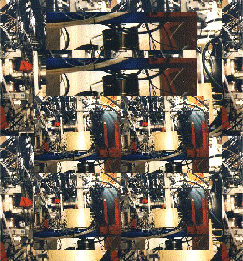 b r a c k e t b r a c k e t 8 A column of sorts by Paul Smedberg
There is a very good saying that
if triangles invented a god, they would make him three-sided.
I have come to believe that the
whole world is an enigma, a harmless enigma that is made terrible by our
own mad attempt to interpret it as though it had an underlying truth.
A mathemetician is a blind man
in a dark room looking for a black cat which isn't there.
I knew a mathemetician who said,
'I do not know as much as God, but I know as much as God did at my age.'
All are lunatics, but he who
can analyze his delusion is called a philosopher.
An intellectual is a man who
doesn't know how to park a bike.
Human development has two stages:
in the first we think about things; in the second we begin to think about
thinking. When we recognize that what we perceive is a representation of
reality that could differ from it in essential ways we have invented philosophy.
Above quotes lifted from Pi in the Sky by John D. Barrow, Oxford University Press, 1992 |
Wrote Thomas Aquinas of God. He can't forget anything, commit sins, and, according to St. Thomas, he can't make the sum of the internal angles of a triangle add up to more than two right angles. Well why not? Why are the gravitational constant, the speed of light, and all the other constants . . . why are they constant? Why not some other number? Why don't they move around? Would we all be a little taller, a little thinner, maybe even a little richer if the gravitational constant were a wee tad less? Why is Pi 3.1415926535 . . . Why not, oh, say, about four-and-a-half? What would plants look like if Pi were about four-and-a-half? It's about time for science to get up off its soft fat BEE-hind and ask some really mind-bending questions. Quit whining about the easy stuff. Let's get to the crux of the biscuit. Sometimes asking the right question is . . . well, if not half-way toward a solution, maybe 15% of the way.
Here's an interesting FAQ (Frequently Asked Questions) from the Mahabharata. Written in sanscrit in India between 200 B.C. and 200 A.D., it is the world's longest poem, with 90,000 couplets. To see the answers to each question, highlight the text following the word "Answer" with your mouse-cursor. Question: What is quicker than the wind? Answer: Thought Question: What can cover the earth? Answer: Darkness Question: Who are more numerous, the living or the dead? Answer: The living, because the dead are no longer Question: Give me an example of space. Answer: My two hands [held together] as one Question: An example of grief. Answer: Ignorance Question: Of poison. Answer: Desire Question: An example of defeat. Answer: Victory Question: Which came first, day or night? Answer: Day, but it was only a day ahead Question: What is the cause of the world? Answer: Love Question: What is your opposite? Answer: Myself Question: What is madness? Answer: A forgoten way Question: Why do men revolt? Answer: To find beauty, either in life or in death Question: What, for each of us, is inevitable? Answer: Happiness Question: What is the greatest wonder? Answer: Each day, death strikes and we live as though we are immortal. --Transcribed from Peter Brook's tv version of the Mahabharata which has aired on American PBS, the BBC, and probably a few other tonier networks worldwide. |
Want to wander around blindly in a neo-cubist maze of big science? |

|
|
Ad agencies are like Cyrano Like Rembrandt Industrial poets with 30 second haiku operas. |

There were five of them, That's how white your clothes can get with |